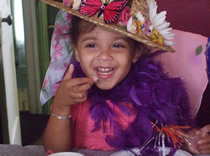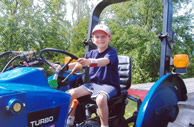RAISING PRESCHOOLERS TEACHING VALUES
Young children love to hear stories about their parents' childhood. There are probably stories you could share about how you learned to be honest, kind, or brave. There may be some less favorable stories you may remember as well. Don't brag about the times you got in trouble with your parents or teachers unless you can point out a lesson that you learned. If you brag about your trouble-making times, your children can be expected to try to outdo you, but the shoes will be on different feet, and you may not appreciate the naughtiness you've taught your children.
Your children will also be learning values by watching you. If you keep the extra change when the cashier gives you too much, if you brag about cheating on your income taxes, if you're disrespectful to your spouse or parent, you children will literally copy your actions. Look for teaching moments with your children. Tell them that you've given the correct change back, although you could have kept it, because it's important to be fair and honest. Explain that you may have differences with your spouse or mother, but that you're willing to discuss and compromise with the people you love. Life is an exciting story to preschoolers. They don't yet refer to parents' discussions as lectures. They love to listen to you and feel your undivided attention. You have wonderful opportunities to teach good values and to help children distinguish between right and wrong. Remember that preschoolers are very literal and concrete in their thinking. The nuances and ambiguities may need to wait until they're a little older. Preschoolers see and hear you in black and white. The grays and shadings can be postponed for their readiness. KINDNESS AND CONSIDERATION Children can be taught to be kind and considerate by observing their parents' and caretakers' kindness, by specific explanation of kind behaviors, and by adults valuing, noticing, and praising children's kind behaviors. They can also learn about kindness when parents read or tell stories about kindness or comment on the kindness of others in their environment. For example, when your children carry a kitty that has strayed back to it's mommy or help their baby sister or brother pick up their toys, parents can label the behavior as "kind" and tell their children how pleased they are to see that kindness.There are many books and stories about kindness, and your children will love them. I remember reading a book called Kindness is a Lot of Things! to our own children hundreds of times. DISCIPLINE Parents and teachers are concerned about appropriate discipline for their kids from the time they are toddlers through middle childhood and teenage years. The goals of discipline are to lead children toward learning skills and values that will prepare them for adulthood when they will eventually depend entirely on self-discipline. Hopefully, their personal self-discipline will result in their leading happy, fulfilling, and caring lives. There should always be a positive emphasis on discipline.Your pleasure in your children's accomplishments and your disappointment in their inappropriate behaviors are your most effective tools.Realistic parents also find that there are times when raising their voices or setting firm limits are the requirements for helping children grow in confidence.The principle to remember in giving children choices is only to give them the choices that they are capable of making responsibly. Don't give them choices when you know what is best for them and logical consequences won't be obvious until the future or the logical consequences are dangerous. When you know what's best, be positive and directive, and your children will have confidence in your guidance. Time-out can be very effective for setting limits for preschool children if it is used appropriately and not too frequently. Overuse takes place as a poor substitute for positive planning, is counterproductive, and causes parents to believe time-out isn't effective.
PLANNING AND ENRICHING Parents who take responsibility for planning a preschooler's day provide a positive framework for their children. The planning must be flexible and provide opportunities for safe exploration and appropriate stimulation. It should also include time for children to play alone and with others, indoors and outdoors.The home, neighborhood, and community provide opportunities for children to learn through play. Particular toys provide a variety of appropriately enriching play. A neighborhood walk to the fire station, park, or library broadens opportunities while providing exercise and fresh air.
By age three, children will be eligible for some of the community enrichment classes that are available for preschoolers. Classes in three categories are usually available: 1) play, 2) physical fitness, and 3) learning. Of course, the categories may also provide overlapping opportunities. If your children are in a day care or preschool program, they may already have a full program for each of these, and time at home with you is their most important need. If you are at home with them full time, a play group in which they can learn to interact with other children is a high priority. The physical fitness needs can be best fulfilled by dance, gymnastics, tumbling, or swimming classes. The community may also provide some beginning sports fun, but generally, competitive sports should be postponed until school age. Learning programs could include music, computers, story hours, or science fun. Although preschoolers can benefit from some exposure to lessons, be sure not to overprogram your children. Two or three activities a week suffice, and preschoolers require plenty of time for play, rest, and time alone with parents or child-care providers. Parents also need to consider their own time constraints in planning for their children. COMMUNICATING WITH YOUR Whether you have child care for an evening out, half days during the week, or while you work full time, there needs to be two-way communication. Your first responsibility is to inform the caretaker of how you would like your children cared for including eating, dressing, nap or bedtime routines, guide-lines for activities and discipline, and values for language and safety. You will also need to make arrangements for regular communications from the caretaker to you about your children's daily progress or problems. If child care is brief, this communication can be quite informal, as in a brief chat when you return home. If your child care is for half a day or more, arrange for your child-care provider to keep a journal of daily milestones, questions, comments, or problems. Continued communication will permit you to be supportive of your child-care provider and will help to keep you closer to your children. It will also help to prevent some of the guilt that many parents feel when they are busy with their careers and wish they could be in two places at once. ©2012 by Sylvia B. Rimm. All rights reserved. This publication, or parts thereof, may not be reproduced in any form without written permission of the author. |
|||||||||||||||||
©2010 by Sylvia B. Rimm. All rights reserved.
Report any problems with this site to Webmaster@sylviarimm.com

 Parents teach children values during their entire childhood, but those taught during the preschool years are foundational for the teaching ahead. Parents have the greatest influence during children's early years. Schools, peers, and the media dramatically affect values during the school-age years. If children are given a good foundation early, they are less likely to be mislead later. The roots of your children's conscience are taught in these early years.
Parents teach children values during their entire childhood, but those taught during the preschool years are foundational for the teaching ahead. Parents have the greatest influence during children's early years. Schools, peers, and the media dramatically affect values during the school-age years. If children are given a good foundation early, they are less likely to be mislead later. The roots of your children's conscience are taught in these early years.

 The local children's museum, petting zoo, or a neighbor's farm or garden introduce child-ren to other worlds of exploration. Even a necessary trip to the supermarket or shop-ping mall can be used for enriching children's learning.
The local children's museum, petting zoo, or a neighbor's farm or garden introduce child-ren to other worlds of exploration. Even a necessary trip to the supermarket or shop-ping mall can be used for enriching children's learning.